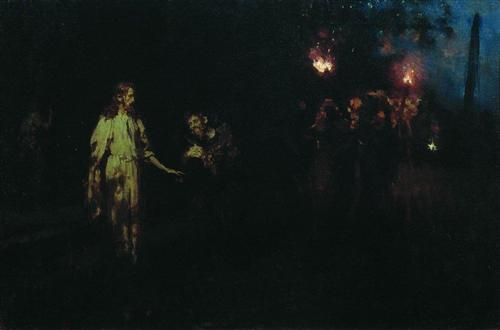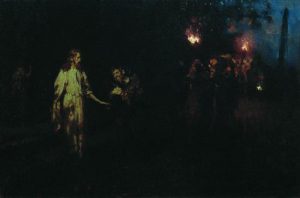Blessed are the poor in spirit, for theirs is the kingdom of heaven (Matthew 5:3).
Suppose a rush of love and grandiosity surged in your heart and you took it upon yourself to change the world for the better. What would you do?
Whatever your answer, you probably would not just sit there and wait.
If anyone changed the world in the name of love, it was Jesus, and for most of the story, he crossed boundaries, recruited disciples, healed the sick, taught the masses, argued with the clergy, prayed, partied, and walked on water. He did as anyone might expect until…
One night in the Garden of Gethsemane, the ever-active Savior prayed as his disciples slept, except the one who showed up with the Roman guard. Judas gave him the kiss of death, and there Jesus’ flurry of activity ended. Thus began his passion (as in “passive”). Jesus was “handed over” (e.g., Matthew 27:26), now the object of others’ activity, now waiting, absorbing, and suffering in silence.
Hard-working Americans cannot imagine such a passive stance in accomplishing anything, least of all changing the world. But Jesus had to stop and allow for substantive change to begin.
By suddenly taking the passive way, Jesus broke the cycle of defensive reactivity that characterizes our spirals into common violence. We blame, demand our rights, enlist others, go on the offensive, flee, whatever it takes to restore safety or gain control. Sometimes those reactions reflect health and strength, sometimes selfishness and immaturity. But Jesus refused the game altogether, and in doing so, exposed the hearts of betrayers, guilty bystanders, and aggressors. From this example, Gandhi and King learned.
Moreover, Jesus’ passivity reflects God. Seldom does God interrupt the natural order of things. God frustrates many with mercy that refuses to crush the merciless despite the damage they do. God allows us space both to flourish and sin, to love and err.
God allows that space because God loves us, and love wants reciprocity, not in a tit-for-tat arrangement, but in a response freely given. From God down to dogs, those who love must eventually reach a vulnerable pause and wait for the response. Hearts hang in the balance.
When Jesus was handed over, the divine heart hung in the night. God became poor in spirit, utterly depending on us to care. We failed God as we so often fail the least of these in whom Christ meets us. But that is not the last word on God or us.
Christ’s resurrection directs God’s once frustrating mercy to us despite our breaking the divine heart. For in Christ’s living, the opportunity still stands to let God’s love complete our joy and our love complete God’s. Granted, we need the Spirit’s help. It takes a lifelong journey and repentance after repentance, love after love, but it is not hard, really. For the desire to please God does in fact please God, to paraphrase Merton. And when the time comes for us to pause and wait, the promised embrace will come.
Related Posts
Dr. King On Overcoming Fear With Love



0 Comments